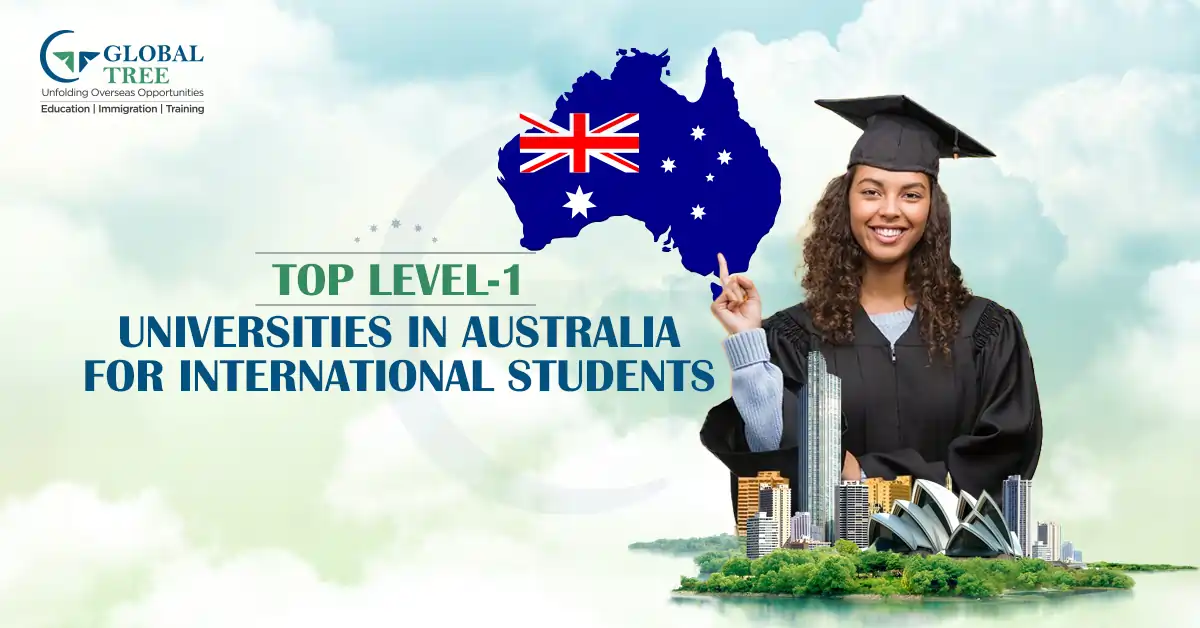Explore the top 10 Level-1 universities in Australia for International students

Introduction
Australia has firmly established itself as a global hub for high-quality education, drawing students from all corners of the world. Among the numerous universities in the country, Level 1 universities are widely recognized for their exceptional academic standards, cutting-edge research facilities, and diverse student communities. In 2023, these institutions continue to uphold their reputation, making them ideal choices for international students seeking a world-class education. This article explores the top Level 1 universities in Australia, highlighting their unique features and why they stand out as prime destinations for international education seekers.
Top Universities to choose from Australia
1. Australian National University (ANU)
Location: Canberra, Australian Capital Territory
Overview: The Australian National University, commonly known as ANU, is a public research university with a strong global reputation. It is situated in the picturesque suburbs of Canberra, Australia's capital city.
What Sets ANU Apart?
- Academic Excellence: ANU consistently ranks as one of the top universities in Australia and the world. According to QS World University Rankings, it holds the prestigious title of being the number 1 university in Australia and 30th in the world.
- Research Prowess: ANU is known for its significant contributions to the global research community. With 6 Nobel laureates and 49 Rhodes scholars among its faculty and alumni, ANU is a research powerhouse.
- Member of Go8: ANU is a proud member of the Group of Eight (Go8), a coalition of Australia's most research-intensive universities. It is also the only Australian member of the International Alliance of Research Universities.
- Employability: The university consistently ranks as the institution with the most employable graduates in Australia, according to research published by THE.
- Diverse Student Body: ANU is home to about 18,000 students from over 100 different countries, creating a multicultural and competitive learning environment.
- Flexible Degrees: ANU offers flexible degree options, allowing students to pursue two undergraduate degrees simultaneously and graduate with two qualifications.
Fees and Scholarship Options:
The average annual fee for an undergraduate degree at ANU is approximately AU $48,005.
ANU provides over 200 scholarship options for international students, including the prestigious Tuckwell Scholarship Programme, the Chancellor's International Scholarship, and various Academic Merit Scholarships.
Eligibility: Each course at ANU has its own set of entry requirements, but the general undergraduate requirements in Australia include completing senior secondary studies or one year of an Australian Bachelor Degree or an equivalent qualification.
Courses Offered and Admission Process:
ANU offers a diverse range of programs across seven academic colleges, including arts & social sciences, science, Asia & the Pacific, engineering & computer science, health & medicine, law, and business & economics. Students can apply online and are required to pay application fees.
2. University of Melbourne
Location: Melbourne, Victoria
Overview: The University of Melbourne, often referred to as Melbourne University, is Australia's second oldest university and one of the country's most prestigious institutions.
What Sets the University of Melbourne apart?
- Academic Excellence: The University of Melbourne consistently ranks among the top universities in Australia and globally. It is number 2 in Australia and 33rd in the world according to QS World University Rankings.
- Rich History: With over 160 years of history, the university has built a strong reputation for higher education.
- Graduate Employability: In 2021, it was ranked 8th in graduate employability worldwide by QS rankings.
- International Diversity: The University of Melbourne boasts a diverse student body, with over 40% of its students being international, creating a multicultural campus.
- Research Opportunities: Students have access to over 100 research centers and institutions, providing extensive opportunities for research collaboration.
Fees and Scholarship Options:
- Tuition fees vary depending on the course, ranging from approximately AU $31,870 to $75,840 per year.
- The university offers numerous scholarships based on academic merit, area of interest, and financial need.
Eligibility:
- The eligibility requirements for undergraduate and postgraduate courses vary, but generally, applicants must hold a recognized qualification equivalent to Australian Year 12 for undergraduate programs.
- English language proficiency, as demonstrated by IELTS, TOEFL, or equivalent scores, is a mandatory requirement for international students.
- Some courses may require GRE/GMAT scores or proof of work experience.
(Read More: Things to know before opting Australia for study abroad)
Courses Offered and Admission Process:
The University of Melbourne offers a wide range of courses in fields such as computer science, engineering, health, humanities, and more. The application process involves selecting a course from the online catalogue, ensuring you meet admission requirements, submitting the application online, and tracking the application's progress.
3. University of Sydney
Location: Sydney, New South Wales
Overview: The University of Sydney, Australia's oldest university, boasts a rich history spanning 173 years. It has a reputation for research, critical thinking, and pioneering education.
What Sets the University of Sydney Apart:
- High Rankings: The university consistently ranks in the top 50 universities globally and is placed at number 3 in Australia, according to QS and THE rankings, respectively.
- Graduate Employability: It ranks 1st in the nation and 4th in the world for graduate employability.
- Research Opportunities: As a member of the prestigious Group of Eight (Go8), the university has access to a variety of research centers and institutions, providing extensive research opportunities.
- Career Support: Students can gain real-world experience and receive career support to enhance their employability.
- Flexible Undergraduate Degrees: The University of Sydney offers flexible undergraduate degree programs, allowing students to tailor their education to their interests and career goals.
Fees and Scholarship Options:
- Tuition fees at the University of Sydney vary depending on the course, ranging from approximately AU $40,000 to $72,000 for the first year.
- The university offers several scholarships for international students, including the Sydney Scholars India Scholarship, Vice Chancellor's International Scholarship Scheme, and Sydney International Student Awards.
Eligibility:
- Undergraduate requirements include completing a recognized qualification equivalent to Australian Year 12 and meeting prerequisite courses. Minimum GPA requirements may also apply.
- Proof of English language proficiency, such as IELTS or TOEFL scores, is mandatory for non-native English speakers.
- Some postgraduate courses may require a recognized bachelor's degree along with relevant work or research experience.
Courses Offered and Admission Process:
The University of Sydney offers a wide range of undergraduate, postgraduate, and doctoral programs across various disciplines. The admission process involves selecting a suitable course, reviewing eligibility requirements, gathering required documents, preparing finances, submitting the application online, and tracking the application's progress.
(Read More: The Upcoming intakes in Australia for 2023-2024)
4. University of New South Wales (UNSW)
Location: Sydney, New South Wales
Overview: Located in Sydney, the University of New South Wales (UNSW) is another Level 1 university in Australia known for providing a top-notch career-based education with a hands-on approach.
What Sets UNSW Apart?
- Strong Rankings: UNSW is ranked 4th in the country and 44th in the world according to QS rankings and 6th nationally according to THE rankings.
- Engineering and Law Excellence: It is renowned for having one of the best engineering and law academic system to study in Australia.
- Industry Connections: UNSW emphasizes building industry connections while students are at the university, enhancing their job prospects.
- Employability: It was named the Australian Financial Review's Most Employable University in 2022.
- Campus Life: Students can maintain a good study-life balance and enjoy the campus, which is conveniently located near the beach.
[You may also like: 50 Amazing Places to Visit in Australia]
Fees and Scholarship Options:
- The average annual tuition fee at UNSW ranges from approximately AU $38,640 to AU $50,640.
- UNSW offers various scholarship opportunities for international students, including the International Scientia Coursework Scholarship, Australia's Global Award, India Future of Change Scholarship, and more.
Eligibility:
- Eligibility requirements for undergraduate and postgraduate courses typically include a recognized qualification equivalent to Australian Year 12 for undergraduate programs.
- English language proficiency, as demonstrated by IELTS, TOEFL, Pearson Test, CAE, or CPE scores, is required for non-native English speakers.
- Some courses may require a higher GPA, work experience, or specific prerequisites, including standardized tests such as GRE or GMAT.
Courses Offered and Admission Process:
- UNSW offers a wide range of undergraduate and postgraduate courses, with popular programs in computer science, engineering, health, and humanities.
- The application process in Australia involves selecting a course, ensuring you meet admission requirements, preparing finances, submitting the application online, and tracking the application's progress.
5. University of Queensland
Location: Brisbane, Queensland
Overview: Established in 1909, the University of Queensland (UQ) is another top public research university in Australia known for its significant contributions to medical research and innovation.
What Sets UQ Apart:
- High Rankings: UQ is ranked 5th in the country and 50th in the world according to QS rankings and 3rd in the country according to THE rankings.
- Research Leadership: UQ is a leading member of the Group of Eight universities and is renowned for its commitment to research and contributions to society.
- Teaching Awards: The university has won numerous teaching awards, and it is recognized for its dedication to quality education.
- Global Research Institutes: UQ hosts 8 globally recognized research institutes and over 100 research centers, fostering an interdisciplinary community of scientists, social scientists, and engineers.
Fees and Scholarship Options:
- The average annual tuition fee at UQ is approximately AU $45,206.
- UQ provides over 100 different scholarships across various levels of study for international students.
Eligibility:
- Eligibility requirements for undergraduate courses typically include completing Queensland Year 12 or an equivalent qualification, along with minimum entry scores and subject prerequisites.
- Proof of English language proficiency, such as a minimum IELTS score of 5.5 or equivalent, is required for Australian education.
- Some programs may also require proof of previous degrees or professional experience.
Courses Offered and Admission Process:
UQ offers around 128 undergraduate and 172 postgraduate courses across various disciplines. The admission process involves course selection, reviewing entry requirements, gathering required documents, preparing finances, submitting the application online, and tracking the application's progress.
6. Monash University
Location: Melbourne, Victoria
Overview: Named after World War I General Sir John Monash, Monash University is a public research university with a global presence, including campuses in Malaysia, Mumbai, Italy, China, and Indonesia.
What Sets Monash University Apart?
- High Rankings: Monash University is ranked 6th in the country and 57th in the world according to QS rankings and 2nd in the country according to THE rankings.
- Multicultural Ethos: The university prides itself on its multicultural campus, with students from 170 countries, creating a diverse and inclusive learning environment.
- Flexible Study Options: Monash offers a wide variety of flexible study options, allowing students to tailor their education to their interests.
- Global Research Collaborations: Students have access to over 100 international partners for research collaborations and overseas experiences.
Fees and Scholarship Options:
- Annual tuition fees at Monash University vary, typically ranging from AU $38,900 to AU $53,000 for a full year of 48 credits.
- The university offers over 200 types of financial aid, including scholarships, awards, and fee discounts for its students.
Eligibility:
- Satisfactory completion of final year secondary school or an equivalent qualification is required for undergraduate programs.
- Minimum IELTS score of 6.5 or equivalent in TOEFL, Pearson Test, CAE, or CPE is required for non-native English speakers.
- Some courses may have additional requirements, such as a higher GPA, work experience, or specific prerequisites, including standardized tests like GRE or GMAT.
(Read More: Top reasons for Australia student visa rejections)
Courses Offered and Admission Process:
Monash University offers 142 undergraduate courses and 174 postgraduate courses. Students can apply directly online through the university's website.
7. University of Western Australia (UWA)
Location: Perth, Western Australia
Overview: With its main campus in Perth and a secondary one in Albany, the University of Western Australia (UWA) provides students with ample opportunities for pioneering research and international collaborations.
What Sets UWA Apart?
- Strong Rankings: UWA is ranked 7th nationally and 90th globally according to QS rankings and 8th in the country according to THE rankings.
- Global Connections: UWA boasts over 150 renowned partner institutions worldwide, providing students with opportunities for semesters abroad and international experiences.
- Research Excellence: UWA is in the top 1% worldwide for 43 of the subjects it teaches, demonstrating its research prowess and higher education in Australia is considered the best.
Fees and Scholarship Options:
- Tuition fees at UWA range from approximately AU $34,900 to $74,000, with medical courses being among the most expensive.
- UWA offers the Global Excellence scholarship, which can provide students with AU $24,000 to $48,000 over 2 to 4 years based on academic merit.
Eligibility:
- Eligibility for undergraduate programs typically involves completing recognized higher secondary education or an equivalent qualification with a minimum GPA.
- English language competence must be demonstrated through completion of an accepted English qualification or by meeting minimum English language scores in an accepted test.
Courses Offered and Admission Process:
UWA offers a wide range of undergraduate and postgraduate courses. The admission process involves course selection, reviewing entry requirements, gathering required documents, preparing finances, submitting the application online, and tracking the application's progress.
8. University of Adelaide
Location: Adelaide, South Australia
Overview:The University of Adelaide, situated in Adelaide, South Australia, is a distinguished member of Australia's prestigious Group of Eight (Go8) universities. It stands out for its commitment to academic excellence, cutting-edge research, and extensive scholarship opportunities for international students.
(Read More: List of cheapest universities in Australia for Indian students)
What sets Adelaide apart?
- Academic Excellence and Research Focus: The University of Adelaide is a member of the Group of Eight (Go8) and consistently ranks among Australia's top
- universities. It has a strong emphasis on research, contributing to various fields and industries.
- Flexible Degree Options and Scholarships: The University of Adelaide offers flexible undergraduate degree programs, allowing students to tailor their education. The university provides a range of scholarships for international students, including the Adelaide International Undergraduate Scholarships.
Admission Requirements:
Undergraduate entry requirements usually include completion of recognized secondary education or an equivalent qualification. Proof of English language proficiency, often demonstrated through IELTS, TOEFL, or similar tests, is required for non-native English speakers. Some universities may have specific IELTS Band requirements to get admission in Australia.
Courses and Application:
The university offers a wide range of undergraduate, postgraduate, and research programs across various disciplines. Students can apply online, ensuring they meet the admission criteria and providing necessary documents.
9. University of Technology Sydney (UTS)
Location: Sydney, New South Wales
Overview:The University of Technology Sydney (UTS), nestled in the vibrant city of Sydney, New South Wales, is celebrated for its innovative and practical approach to education. With a strong emphasis on industry connections and real-world experience, UTS is a top choice for students seeking a dynamic and career-focused education.
What Sets UTS Apart:
- Innovative Education and Industry Connections: UTS is renowned for its forward-thinking approach to education, preparing students with practical skills and industry connections.
- Competitive Fees: The university offers competitive tuition fees that vary based on the chosen program.
- Scholarship Opportunities: UTS provides a range of scholarships designed to support international students in their academic pursuits.
Eligibility and Admission Process:
Undergraduate eligibility generally includes completion of recognized secondary education or an equivalent qualification. Proficiency in English is a prerequisite, and specific programs may have additional admission requirements. Exams like TOEFL plays a key role while studying abroad. They help in analysing the English proficiency of non-native English speakers.
Programs and Research Opportunities:
UTS offers a wide selection of undergraduate and postgraduate programs spanning diverse fields. The university's commitment to research contributes to innovation and advancements in various industries.
10. University of Newcastle
Location: Newcastle, New South Wales
Overview:The University of Newcastle, nestled in the coastal city of Newcastle, New South Wales, is celebrated for its inclusive and supportive learning environment. This institution consistently earns high rankings, both nationally and internationally, making it an excellent choice for students pursuing higher education in Australia.
What Sets the University of Newcastle Apart?
- Inclusive Learning Environment: The University of Newcastle is dedicated to creating an inclusive and supportive environment where students can thrive.
- Global Rankings: It ranks prominently in national and global university rankings, reflecting its commitment to academic excellence.
Fees and Scholarships:
Tuition fees at the University of Newcastle vary based on the specific program. The university offers several scholarships to assist international students.
Eligibility and Admission Process:
Undergraduate eligibility typically involves recognized secondary education or an equivalent qualification. Proficiency in English is required, and specific programs may have additional prerequisites.
(Read More: Most lucrative jobs for MBA graduates in Australia)
Programs and Research Opportunities:
The university offers a broad spectrum of undergraduate and postgraduate programs across various fields. The University of Newcastle actively engages in research activities that contribute to innovation and advancements in numerous industries.
Difference Between Level 1 and Level 2 Universities in Australia
| Characteristic | Level 1 Universities | Level 2 Universities |
|---|---|---|
|
Research Intensity |
High research intensity with a strong emphasis on research contributions. |
Engage in research, but the primary focus is on teaching and education. |
|
Global Recognition |
Globally recognized and often highly ranked in international university league tables. |
May have strong regional or national recognition, but international recognition is limited. |
|
Membership in Prestigious Groups |
Many are members of prestigious groups like Group of Eight (Go8) or Innovative Research Universities (IRU). |
Typically not part of such high-profile groups emphasizing research excellence. |
|
Nobel Laureates and Research Impact |
Often have Nobel laureates among faculty and alumni, indicating significant research contributions. |
While research may be conducted, it may not result in the same level of international impact. |
|
Admission Competitiveness |
Highly competitive for admission due to their global standing and reputation. |
Admission can be less competitive, making them accessible to a broader range of students. |
|
Academic Program Diversity |
Offer a diverse range of academic programs, including undergraduate, postgraduate, and doctoral degrees. |
Provide a wide variety of academic programs, often with a focus on teaching programs that serve regional or national workforce needs. |
How to Apply to Level 1 Universities in Australia?
Applying to Level 1 universities in Australia follows a standard process, which involves the following steps:
- Check Eligibility Research and Choose: Research Level 1 universities in Australia and select the ones that offer the programs you're interested in. Review their admission criteria and make a list of your preferred choices.
- Eligibility requirement: Carefully review the eligibility requirements for the specific program you wish to apply for. Ensure that you meet the academic and language proficiency prerequisites.
- Gather Documents: Collect all the required documents, including academic transcripts, English language proficiency test scores (like IELTS or TOEFL), letters of recommendation, a statement of purpose, and a curriculum vitae (CV).
- Prepare a Statement of Purpose: Write a compelling statement of purpose when applying to study in Australia. It must explain your academic and career goals, why you're interested in the program, and how it aligns with your future plans.
- Submit Application: Complete the online application form provided by the university. You may need to create an account on the university's application portal. Pay the application fee, if required.
- Scholarship Applications: If you're interested in scholarships, research and apply for relevant scholarships for international students offered by the university.
- Provide Proof of English Proficiency: If English is not your first language, provide proof of English proficiency through standardized tests like IELTS or TOEFL.
- Letters of Recommendation: Submit the required number of letters of recommendation. Ensure they are from individuals who can speak to your academic and/or professional qualifications.
- Track Application: After submitting your application, you can usually track its progress online through the university's application portal. Be sure to monitor any updates or additional requirements.
- Wait for Offer: Universities will review your application, and if you meet their criteria, you will receive an offer of admission.
- Accept Offer: Once you receive an offer, carefully review the details and follow the instructions to accept the offer.
- Visa Application: After accepting the offer, you will need to apply for a student visa to study in Australia. Follow the visa application process through the Australian Department of Home Affairs.
FAQs
Q1: What sets Level 1 universities in Australia apart from other institutions?
Level 1 Universities in Australia are distinguished by their exceptional academic standards, cutting-edge research facilities, and diverse and inclusive learning environments. These universities are renowned for their commitment to excellence in education and their ability to prepare students for successful careers in various fields.
Q2: Are there scholarships available for international students at Level 1 universities in Australia?
Yes, many Level 1 universities in Australia offer scholarships and financial aid to international students based on academic merit, leadership qualities, and specific areas of study. Prospective students are encouraged to visit the official websites of these universities for detailed information on available scholarships and eligibility criteria.
Q3: What support services are provided to international students at Level 1 universities?
Level 1 universities prioritise the well-being of international students and offer a wide range of support services, including orientation programs, academic advising, counselling services, language support, and career guidance. These services are designed to help international students adapt to the new academic and cultural environment and succeed in their studies.
Q4: Can international students work part-time while studying at Level 1 universities in Australia?
Yes, international students in Australia, including those enrolled in Level 1 universities, are allowed to work part-time during their studies. The Australian government provides work permits that allow students to work up to 20 hours per week during the academic year and full-time during scheduled breaks. This opportunity enables students to gain valuable work experience while supporting their studies.
Q5: How diverse are the student populations at Level 1 universities in Australia?
Level 1 universities in Australia pride themselves on their diverse and multicultural student populations. International students from various countries and cultural backgrounds choose these universities for their academic excellence and global perspective. The presence of students from different parts of the world enhances the overall learning experience and promotes cultural exchange and understanding.
Conclusion
Choosing the right university is a pivotal decision for international students, shaping their academic journey and future career prospects in Australia. Level 1 universities in Australia, such as the University of Melbourne, the University of Sydney, Australian National University, the University of Queensland, and the University of New South Wales, continue to stand out as beacons of academic excellence and innovation in 2023.
With their unwavering commitment to providing top-notch education, fostering a multicultural environment, and preparing students for the challenges of the modern world, these institutions offer international students a unique opportunity to thrive and succeed.
As the global landscape of education continues to evolve, these universities remain steadfast in their pursuit of excellence, making them ideal choices for aspiring scholars from around the world.









